Understanding Anglican Catholicism: Roots, Rituals, and Resonance
Dec 26, 2023
Understanding Anglican Catholicism: Roots, Rituals, and Resonance
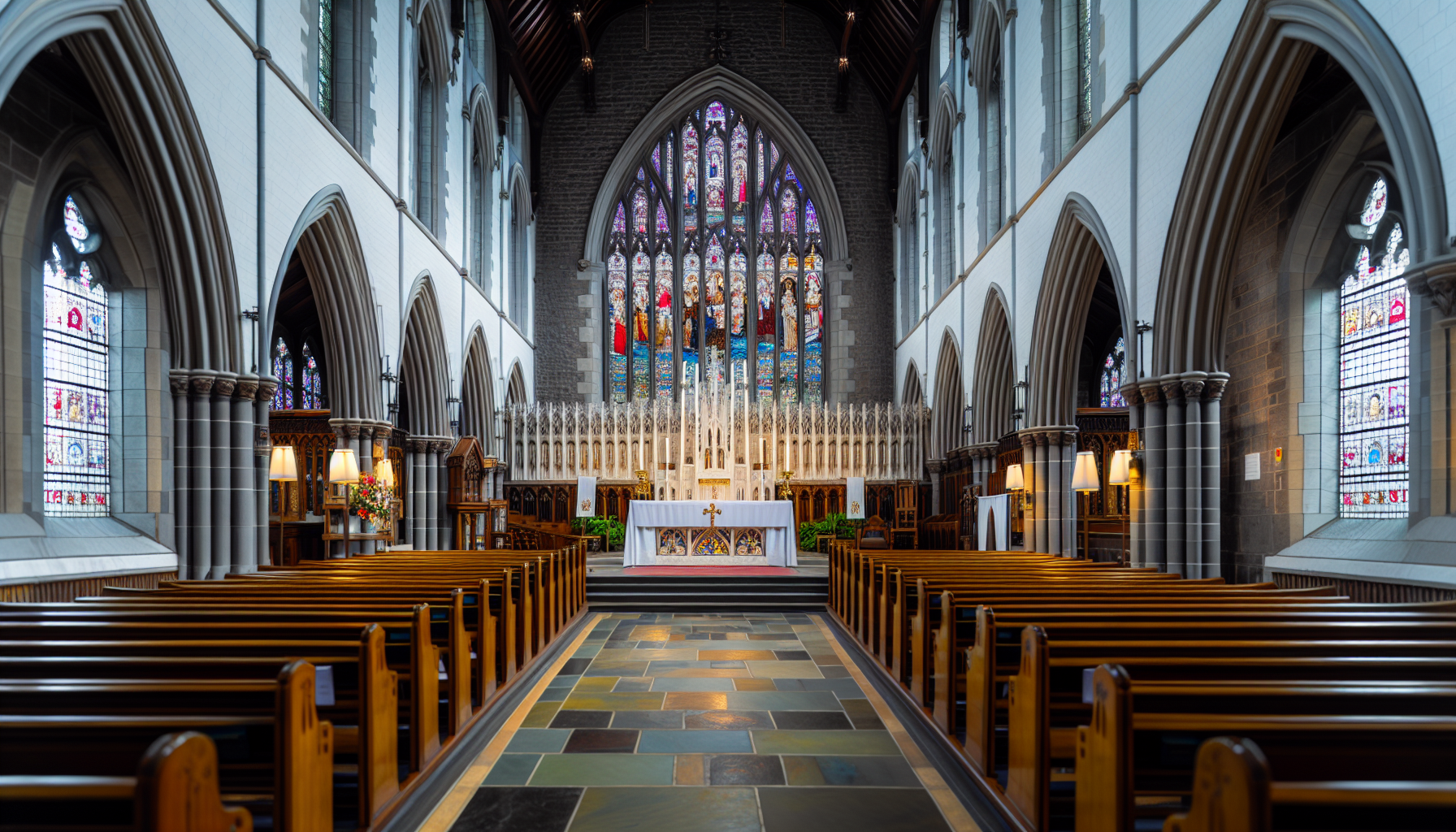
Anglican Catholicism blends the ritualism of Catholic tradition with Anglican independence – but how exactly does it differ from Roman Catholicism? In this article, we unravel the elements that formulate the Anglo-Catholic identity, examining its commitment to sacramental worship, historic ties to the Church of England, and evolving practices that navigate between tradition and modernity. Read on to understand the nuanced position of Anglican Catholicism within the global religious landscape and its relationship with the Roman Catholic Church.
Key Takeaways
-
Anglican Catholicism highlights a profound reverence for sacramental life, cherishing the real presence of Christ in the Eucharist and apostolic succession, deeply rooted in the Church of England and influenced by the Oxford Movement.
-
Holy Communion is central in Anglican Catholic worship; the Anglican Missal enriches such worship through elements from the Roman Rite, and apostolic succession evidences an unbroken lineage of bishops dating back to the early Church.
-
Anglo Catholic parishes emphasize community engagement and embody their theology in ornate church designs, with ministries that foster community through shared worship and service activities.
Exploring the Anglican Catholic Tradition
Anglican Catholicism is characterized by:
-
A profound reverence for the sacramental life of the church
-
Traditional Christian practices
-
Roots that extend deeply into the Church of England and the Oxford Movement
-
A rich tradition within the Anglican Communion
-
An intricate connection to a deep respect for the Church Fathers and traditional Christian practices
-
An emphasis on the Catholic heritage and identity of the different Anglican churches
This tradition has played a significant role in shaping the faith of countless believers.
The sacramental life of the church is of paramount importance to Anglo-Catholics. They emphasize:
-
The real presence of Christ in the Eucharist
-
The apostolic orders of Bishops, Priests, and Deacons
-
Liturgy and worship are carried out in a way that maintains the beauty of sanctity
These components contribute to uniting believers in their approach toward theological identity, liturgy, and devotion. Anglicans perceive their restored ritualism as a manifestation of their aspiration to revert to the fundamental aspects of catholic identity and ritual as observed in the early church.
The Church of England's Path to Catholicity
Anglo-catholicism is a term that describes the catholic faith characteristics of the Church of England. It is often used to refer to those within the Anglican Communion who hold strong Catholic beliefs and practices while remaining part of the Protestant tradition.
Some may view Anglo-catholicism as a contradiction in terms – how can one be both catholic and protestant? However, this movement within Anglicanism has been present for centuries and has had a significant impact on the development of the Church of England. being Anglo-catholic is not necessarily a contradiction.
The roots of Anglo-catholicism can be traced back to the Oxford Movement in the 19th century, where a group of Anglican theologians sought to revive Catholic traditions within the Church. They emphasized the importance of apostolic succession, sacramental worship, and the authority of bishops – all key aspects of Catholicism.
This movement faced opposition from within the Church, with some seeing it as a threat to the Protestant identity of Anglicanism. However, many were drawn to the rich liturgical traditions and emphasis on social justice that Anglo-catholicism promoted.
The Church of England embarked on its journey towards Catholicity with the Elizabethan Settlement. This significant historical instance aimed to attain a critical equilibrium between reform and tradition, addressing the needs of catholic Anglicans desiring to preserve their Catholic heritage while also embracing the reformation. In this historical transition, Queen Elizabeth I played a pivotal role by rejecting the pope’s offer to sanction the new Anglican rite and declining to restore relations with Rome. This decision had a significant impact on Anglican priests and their role within the Church of England.
Interestingly, Queen Elizabeth I diverged from Catholic belief in her objection to the elevation of the Host during the Eucharist, dismissing it as ‘cookie worship.’ This stance contrasted with the catholic Anglican belief in the real presence of Christ in the Eucharist.
The Oxford Movement's Influence
The Oxford Movement, initiated in the 19th Century, had a profound impact on the Church of England. It aimed to rejuvenate the Church’s Catholic heritage and highlight its apostolic origins, rooted deeply in the teachings of Lord Jesus Christ. Spearheaded by notable figures such as John Henry Newman and Edward Bouverie Pusey, this movement advocated for a Catholic interpretation of the Church of England.
The Oxford Movement’s primary objectives were:
-
To defend the Church of England as a divinely founded institution
-
To uphold the doctrine of apostolic succession
-
To uphold the Book of Common Prayer as a ‘rule of faith’
The response of the movement to the crisis of modernity was to advocate for the rightful heritage of Anglicanism as a full member of the ancient Church through its unbroken succession of apostolic bishops.
Furthermore, it sought to revitalize the Anglican tradition by aligning it more closely with the universal Church.
Contemporary Anglican Catholic Identity
In the contemporary landscape, the Anglican Catholic identity is strikingly diverse, with both traditionalist and progressive strands coexisting within the broader Anglican Communion. This diversity is embodied in organizations such as Forward in Faith, which represents traditionalist perspectives, particularly in opposition to the ordination of women while Affirming Catholicism and the Society of Catholic Priests align with more progressive viewpoints.
Despite its challenges, being an Anglo-Catholic has continued to thrive and evolve over the years. It has influenced the development of Anglican liturgy, music, and theology, as well as played a vital role in social justice movements. This has been seen through the work of prominent Anglo-catholic figures such as Cardinal John Henry Newman and Archbishop William Temple.
The journey from Anglicanism to Catholicism is one of deep spiritual exploration and growth. It requires a strong faith, an open heart, and a willingness to continually seek the truth. While it may not be an easy path, it is filled with grace, love, and a deeper understanding of God's plan for us. So to go from Anglican to catholic means to embark on a journey that will ultimately lead you closer to the heart of Jesus.
Internationally, Anglican Catholic identity varies in terms of:
-
the ordination of women
-
the allowance for clergy to marry and have families
-
the degree of local control and autonomy within each country’s Anglican Church.
Sacramental Worship in the Anglican Communion
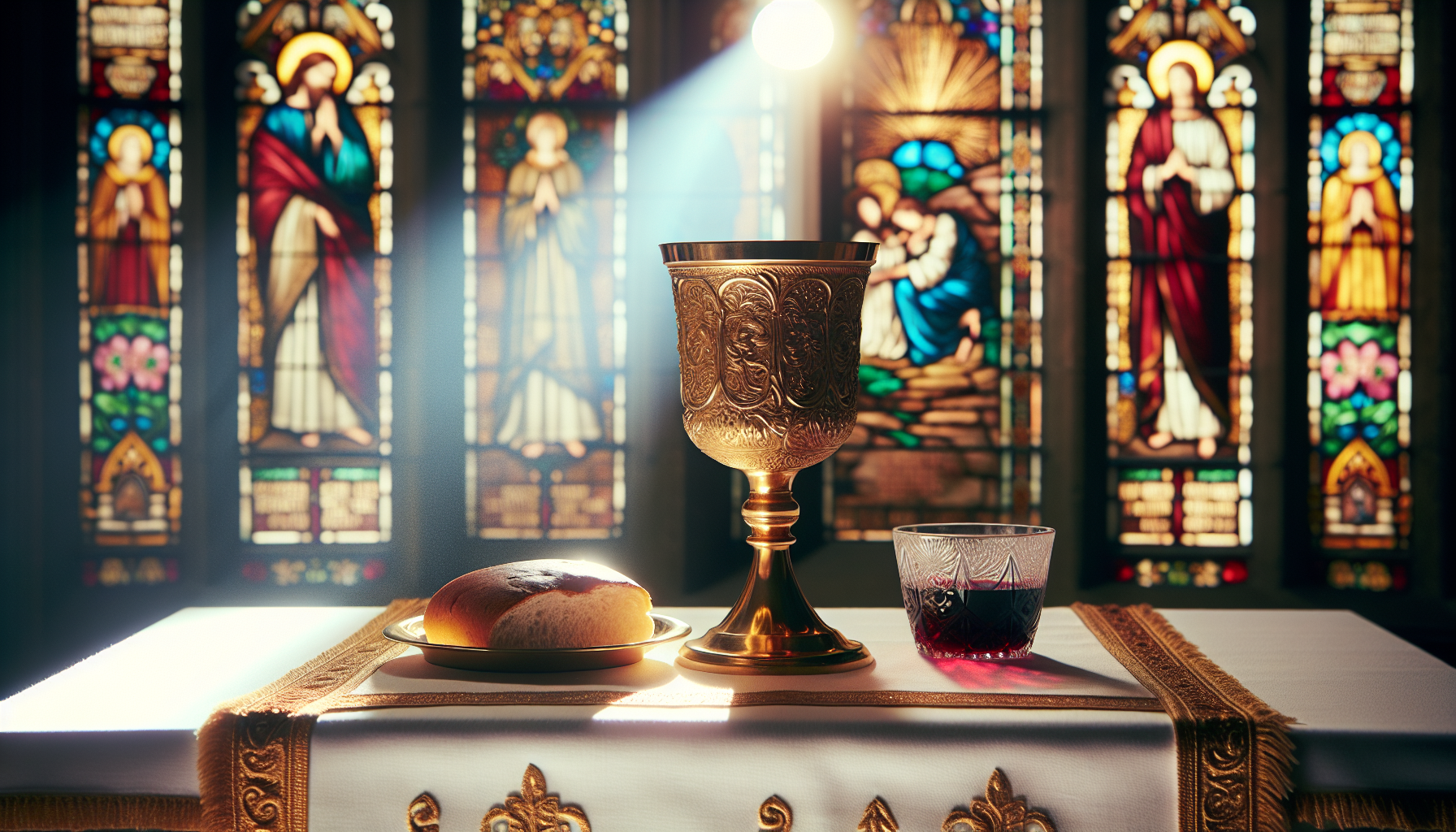
Sacramental worship forms the core of Anglican Catholicism. The Anglican Missal, a liturgical text that supplements the Prayer Book’s rite for Holy Communion, plays a pivotal role in this aspect of worship. It reinstates components of the Western Mass that were previously omitted, thereby enriching the sacramental worship in the Anglo-Catholic tradition.
In the Anglican Catholic Tradition, Holy Communion holds immense importance as it is considered a sacrament through which God’s grace is conveyed to the faithful recipients. The believers partake in the Eucharist with the conviction that the body and blood of Christ are genuinely present in the consecrated bread and wine. This belief is demonstrated through the celebrant’s profound reverence for the sacrament and the utilization of valuable vestments and ceremonial items.
Holy Communion: The Heart of Worship
Holy Communion sits at the core of Anglican Catholic worship. This sacrament serves as an encouragement to Christians on their spiritual journey and celebrates the communion they have with God and with each other. It thus emerges as the central aspect of worship, uniting the faithful and providing spiritual nurture.
In Anglican Catholicism, the belief in the Real Presence of Christ in the Eucharist is firmly held. The interpretation is that Christ’s presence is not confined to the elements but to the deserving recipient. The Anglican Church does not subscribe to the Catholic doctrine of transubstantiation but holds the conviction of the spiritual presence of Christ during the sacrament.
The Role of the Anglican Missal
Anglo-Catholic liturgy considers the Anglican Missal as a crucial resource. It is a compilation of ancient Catholic faith and practice, employed ceremonially by certain Anglo-Catholics and other High Church Anglicans as a substitute or addition to versions of the Book of Common Prayer. It offers a more intricate and ceremonial style of worship that is greatly esteemed in the Anglican Catholic tradition.
The Missal incorporates elements from the Roman Rite and other Catholic traditions into Anglican practice by integrating elements particularly valued from the Book of Common Prayer into the structure of the Roman Rite, influenced also by the Missale Romanum.
The historical background of the Anglican Missal can be traced back to ‘The English Missal’ utilized in the 20th Century for Anglican Catholic worship, which included the entire Missale Romanum.
Apostolic Succession and Anglican Orders
In Anglican Catholicism, apostolic succession and the historic episcopate are essential elements. They stress the importance of maintaining continuity with the early Church and preserving the validity of Anglican orders. The historical background of apostolic succession in the Anglican Church can be traced back to Godwin, Bishop of Lyon in the 7th Century.
The influence of apostolic succession in Anglicanism has been demonstrated through its positioning as both Catholic and its pursuit of unity with other Christian traditions. The historic episcopate holds a significant role in shaping Anglican Catholic identity, involving the distinctive ministry of fostering connections and providing leadership.
Preserving the Historic Episcopate
Anglican Catholicism seeks to preserve the historic episcopate through the consecration of bishops in an unbroken line of succession from the apostles. Apostolic Succession holds significant theological importance in Anglican Catholicism, as it pertains to the unbroken lineage of bishops and church leaders tracing back to Jesus.
Presently, nearly all Anglican bishops, including those in the Protestant Episcopal Church, can demonstrate their Apostolic lineage through the old Catholic Church. The Historic Episcopate is maintained through the belief in each bishop’s participation in the episcopate, granting them entitlement to and accountability for the entire Church. Anglicans affirm the unified assembly of all bishops, referred to as the Historic Episcopate, encompassing:
-
Catholics
-
Anglicans
-
Eastern Orthodox
-
certain Lutheran bishops.
Ordination Rites and the Anglican Ordinariate
The Anglican Ordinariate, established by Pope Benedict XVI, allows for the preservation of Anglican orders and traditions within the Roman Catholic Church. It provides a formal mechanism for unity while honoring the unique Anglican traditions.
The requirements for ordination in the Anglican Ordinariate may differ, but typically, individuals are required to complete the process of becoming Anglican clergy, which includes ordination as deacons and priests.
The Anglican Ordinariate has impacted the relationship between the Anglican and Catholic churches by offering a means for Anglicans to achieve full communion with the Catholic Church while preserving aspects of their Anglican traditions.
Devotion and Piety Among Anglo Catholics
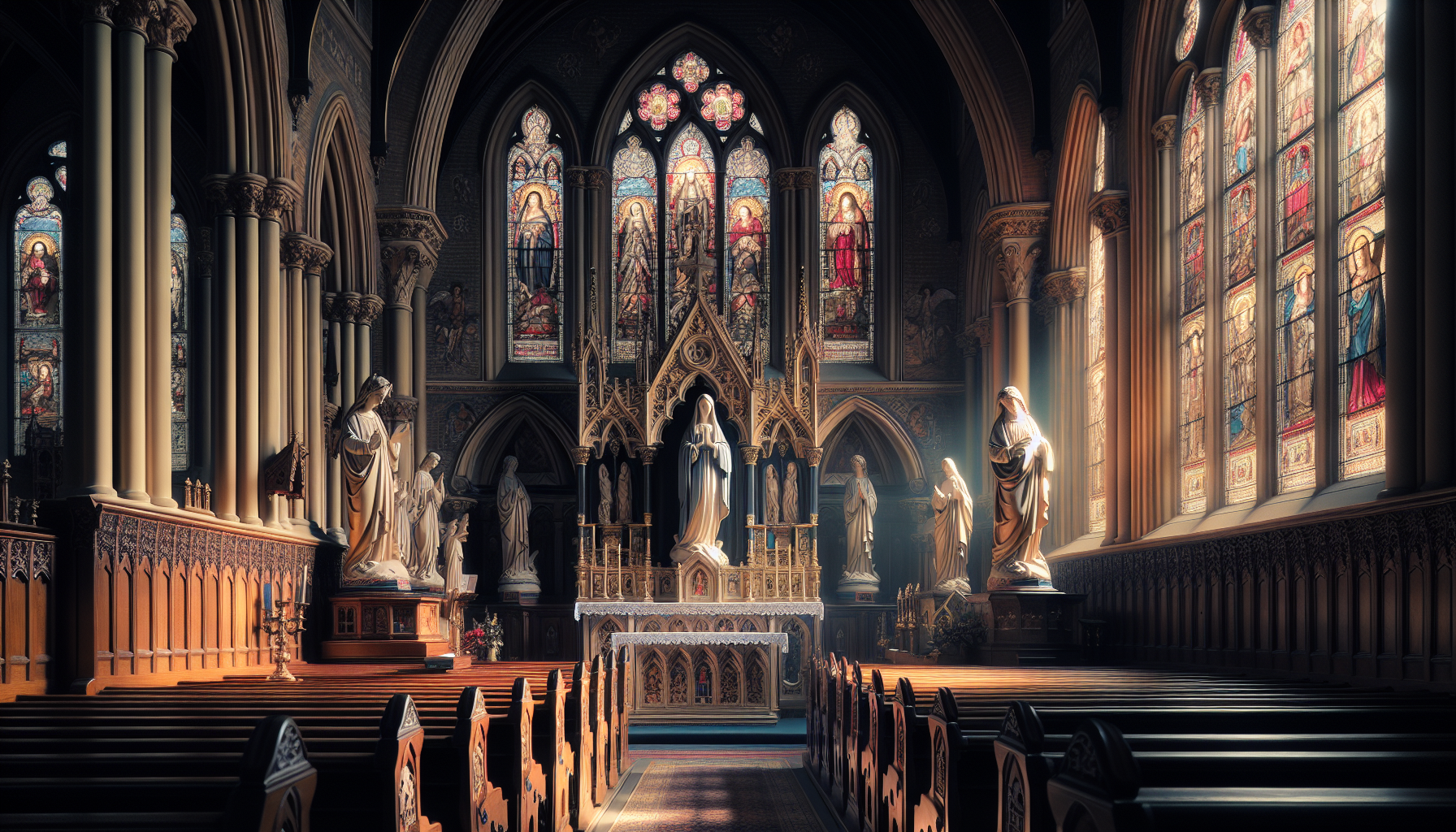
Anglo-Catholic spiritual life, rooted in Anglo-Catholicism, pivots around devotion and piety. Anglo-Catholics engage in the practice of Marian devotions by showing reverence to Mary, the mother of Jesus, through devotional acts such as the Rosary, Angelus, and Regina Coeli. They hold a deep theological respect for Mary’s significance in the mystery of Christ, while also acknowledging that her veneration does not equate to the worship reserved for God alone.
Anglo-Catholics hold the belief that they are spiritually connected with all saints and particularly honor the Blessed Virgin Mary, seeking her intervention and counsel. They uphold a clear differentiation between the respect shown to the saints and the worship exclusively offered to God, while acknowledging that the saints, through their exemplary lives, can serve as influential mediators and mentors in the Christian faith.
Marian Devotions and the Saints
Anglican Catholicism holds the veneration of Mary and saints in high regard, viewing them as exemplars of faithfulness, godliness, and obedience to God. Anglo-Catholics integrate Mary and the saints into their liturgy by:
-
Invoking saints, especially the Blessed Virgin Mary
-
Acknowledging the communion of saints
-
Viewing saints as intercessors, praying alongside them for their intercession.
Common practices in Marian devotion within the Anglo-Catholic tradition include:
-
The recitation of the Hail Mary
-
The use of specific prayers dedicated to Mary
-
A greater acceptance of the invocation of Saints, particularly the Blessed Virgin Mary.
The Blessed Sacrament and Eucharistic Adoration
Eucharistic adoration, including Benediction and other forms of devotion to the Blessed Sacrament, is a key aspect of Anglo-Catholic spirituality. Eucharistic Adoration in the Anglican Catholic tradition entails the veneration and devotion to Jesus, who is believed to be present in the Blessed Sacrament.
The Benediction of the Blessed Sacrament in the Anglican Catholic tradition is a solemn service of worship and adoration during which Jesus Christ is revered in the consecrated Host that is exposed on the altar. This mirrors the Roman Catholic devotion to the Eucharist, where there is also a profound veneration for the presence of Jesus.
Navigating Anglican and Roman Catholic Relations
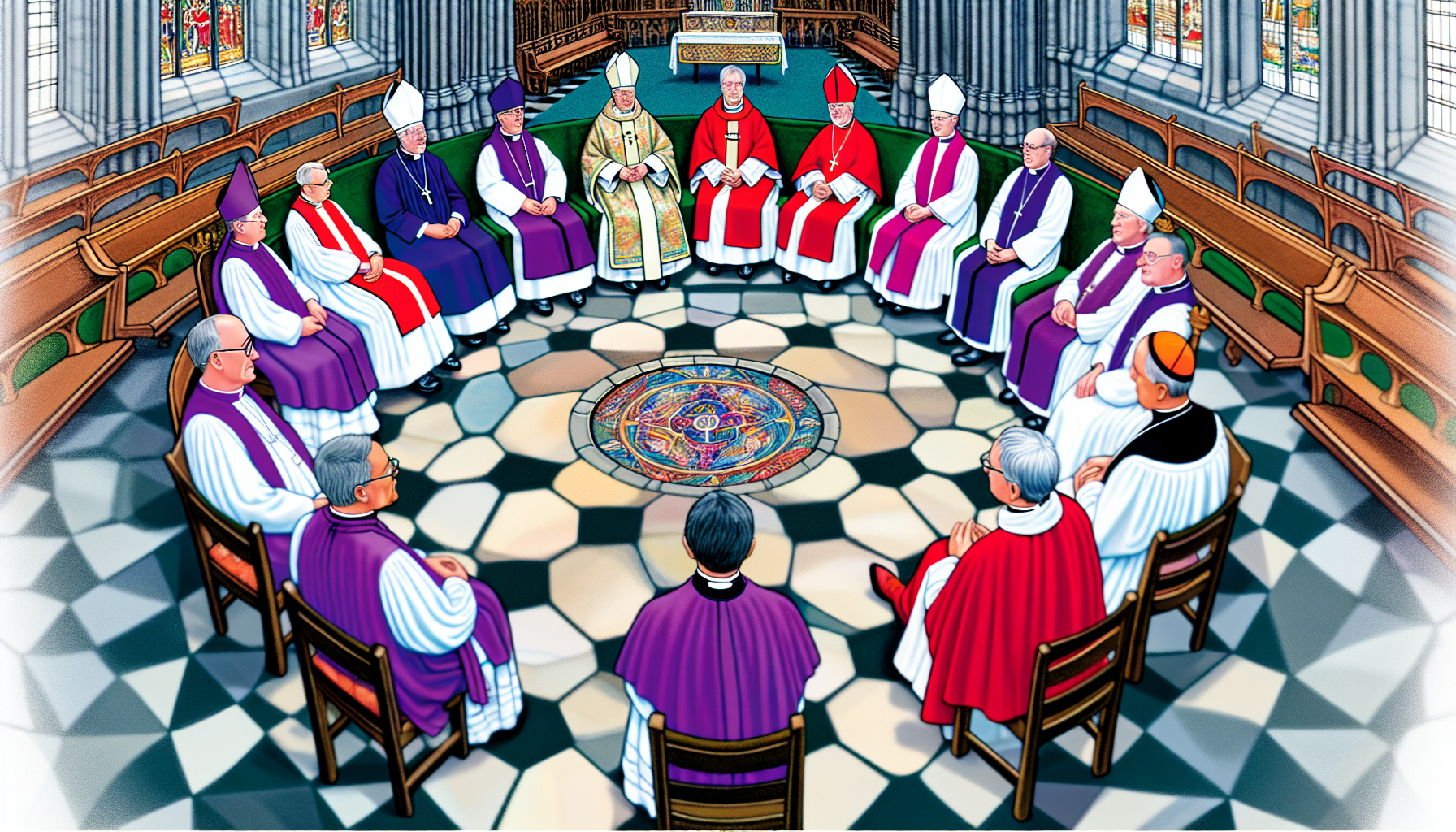
The complex and profound historical impact of the relationship between Anglicans and Roman Catholics began with disputes during the English Reformation and King Henry VIII’s rejection of papal authority in England. The culmination of these disputes led to the establishment of the Anglican-Roman Catholic International Commission (ARCIC) and the International Anglican-Roman Catholic Commission on Unity and Mission (IARCCUM) in the 20th century.
The primary areas of disagreement between the Anglican and Roman Catholic churches revolve around differing perspectives on ordination, specifically the ordination of women. The Anglican Communion functions without a centralized authority akin to the Pope in Roman Catholicism.
Personal ordinariates, established structures by Pope Benedict XVI, have facilitated Anglican communities’ transition into full communion with the Roman Catholic Church while retaining elements of their Anglican heritage.
Ecumenical Dialogue and Unity Efforts
The Anglican-Roman Catholic Ecumenical Dialogue represents the historical exchange between the Anglican Communion and the Roman Catholic Church, facilitating discussions on common experiences, examination of differences, and the exploration of potential resolutions on topics such as salvation and the Church, the Church as Communion, and life in Christ.
The main theological points of disagreement between Anglicans and Roman Catholics revolve around differences in leadership structure (congregational vs hierarchical), celibacy of clergy, and the understanding of the Eucharist (symbolic vs transubstantiation). Despite these differences, specific measures have been put in place to promote collaboration including the formation of dialogue commissions, the release of collaborative publications, and the promotion of mutual learning from the distinct traditions of both groups.
Personal Ordinariates as Bridges
Personal ordinariates are ecclesiastical jurisdictions established for communities of traditionalist Anglicans within the Catholic Church, providing them the opportunity to integrate fully into the Roman Catholic Church while retaining their Anglican heritage. The Personal Ordinariate of Our Lady of Walsingham, the first of its kind, was established on January 15, 2011 in the United Kingdom. It marked a significant development in the Church’s structure.
At present, there are three personal ordinariates established globally. These structures not only provide a mechanism for unity but also honor the unique Anglican traditions, thereby acting as bridges between the two churches.
The Architecture of Faith: Churches and Community
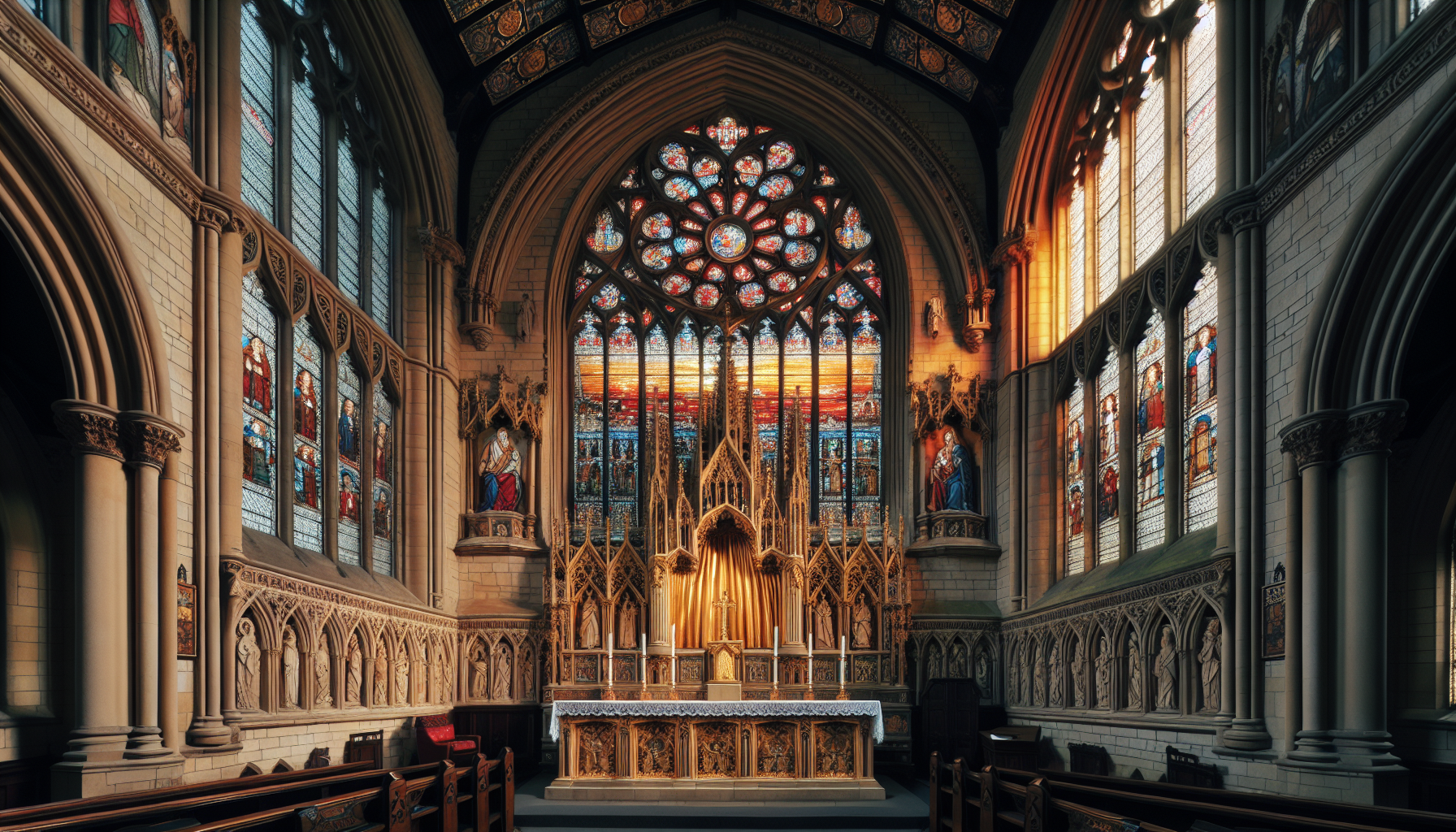
Anglo-Catholic churches’ architectural design mirrors the rich liturgical and devotional life inherent in the tradition. These churches are known for their:
-
intricate and ornate designs, emphasizing grandeur and beauty
-
incorporation of Gothic architecture
-
use of intricate stained glass
-
blend of Gothic and Classical elements
Symbolism is employed as a potent means in Anglo-Catholic church design to communicate theological truths and validate the sanctity of worship.
In the Anglican Catholic tradition, spaces are typically deemed sacred when assigned for holy activities like the Eucharist. The incorporation of:
-
color
-
aesthetics
-
icons
-
imagery
-
sculptures
-
religious art
plays a crucial role in enriching the worship experience and reinforcing the congregation’s awareness of God’s omnipresence.
Sacred Spaces: Church Design and Symbolism
Anglo-Catholic churches are known for their intricate and ornate designs, emphasizing grandeur and beauty. They often incorporate Gothic architecture, intricate stained glass, and a blend of Gothic and Classical elements. This combination of elements serves to create a unique and sacred space for worship, representative of the rich liturgical tradition of the church.
Symbolism is employed as a potent means in Anglo-Catholic church design to communicate theological truths and validate the sanctity of worship. The incorporation of:
-
color
-
aesthetics
-
icons
-
imagery
-
sculptures
-
religious art
plays a crucial role in enriching the worship experience and reinforcing the congregation’s awareness of God’s omnipresence. Sacred art in Anglo-Catholic worship spaces serves to elevate the visual aspects of the sacraments and the presence of God, thereby overcoming plain design.
Building Community in the Anglo Catholic Parish
Establishing a robust community within the Anglo Catholic parish forms an essential aspect of the tradition. Shared worship holds a pivotal role in fostering community within the Anglo Catholic Parish, as it unites members through Eucharistic celebrations that contribute to a lifelong journey of sanctification.
Fellowship within the Anglo Catholic Parish is nurtured by embracing the opportunity for expansion, disseminating the church’s message to a wider audience, and fostering a community that prioritizes theological soundness and accurately portrays the sacraments. Frequent service activities for community building encompass serving on church boards, participating in worship and Sunday school teams, providing technological and office support, as well as engaging in various community action and social ministry activities.
Summary
Anglican Catholicism, with its rich traditions, sacramental worship, and emphasis on community, stands as a significant and influential branch within the broader Anglican Communion. The exploration of its roots, rituals, and resonance serves to illuminate the unique and enduring identity of the Anglican Catholic tradition.
Frequently Asked Questions
Is Anglican catholic the same as catholic?
No, Anglican Catholic is not the same as Catholic because Anglicans maintain distinct theological differences and reject certain beliefs and practices associated with Catholicism.
What are the beliefs of the Anglican Catholic Church?
The beliefs of the Anglican Catholic Church encompass the belief in one God with three elements (Father, Son, Holy Spirit) and the concept of sin causing a relational breakdown with God. This results in the need for Jesus Christ to reconcile this relationship.
Why did Anglican break from catholic?
The Anglican Church broke from the Catholic Church because Pope Clement VII refused to grant Henry VIII an annulment of his marriage to Catherine of Aragon. This led to the Reformation Parliament passing laws abolishing papal authority in England and declaring Henry to be the head of the Church of England.
Can a Roman Catholic receive Communion in an Anglican Catholic Church?
No, according to Papal law, Roman Catholics are not permitted to receive Communion in an Anglican Catholic Church.
How many Anglicans have converted to Catholicism?
At least 15 Anglican bishops have converted to Catholicism through the Anglican ordinariate since its inception, which included four bishops in 2021.
Set-Up A Free Consultation Here Stay connected with news and updates!
Join our mailing list to receive the latest news and updates from our team.
Don't worry, your information will not be shared.
We hate SPAM. We will never sell your information, for any reason.













